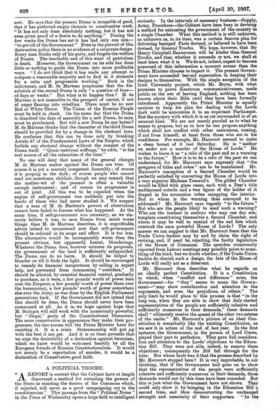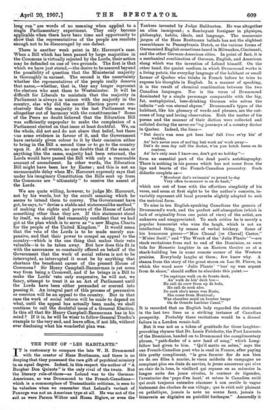A POLITICAL TROCHU.
"A REPORT is current that the Cabinet have at length discovered a method for curtailing the powers of the Peers in resisting the desires of the Commons which, if rejected, will serve as a good campaigning cry in the constituencies." This passage from the" Political Notes" in the Times of Wednesday opens a large field to intelligent curiosity. In the intervals of necessary business—Supply, Army, Procedure—the Cabinet have been busy in devising a method for entrusting the government of the country to a single Chamber. What this method is is still unknown, as unknown as, in its time, was a certain famous plan for delivering besieged Paris devised, or believed to have been devised, by General Trochu. We hope, however, that Sir Henry Campbell-Bannerman will be kinder than General Trochu, and that, whether it succeeds or not, we .shall at least learn what it is. We do not, indeed, expect to become possessed of this information a moment sooner than the Prime Minister chooses to impart it. The present Govern- ment have succeeded beyond expectation in keeping their designs to themselves. With the single exception of the Irish University project, which Mr. Bryce, with what promises to prove disastrous communicativeness, made public on the eve of leaving England, nothing has been known about their Bills until they have been formally introduced. Apparently the Prime Minister is equally anxious to keep his plan for dealing with the Lords dark until he announces it to an expectant Parliamcnt. But the mystery with which it is as yet surrounded is of an unusual kind. We are not merely puzzled as to what be means to propose, but as to how he can propose anything which shall not conflict with other assurances, coming, if not from himself, at least from those who are in his confidence. For example, Mr. Harcourt seemed to make a clean breast of it last Saturday. He is" neither an ender nor a mender of the House of Lords." He wishes to leave it as "a relic of the past and as a warning to the future." How it is to be a relic of the past we can understand, for Mr. Harcourt says expressly that "the gewgaws of titles and robes" are to be maintained. Mr. Harc.ourt's conception of a Second Chamber would be perfectly satisfied by converting the House of Lords into a very superior Madame Tussaud's. The gilded Chamber would be filled with glass cases, each with a Peer's title emblazoned outside and a wax figure of the holder of it draped in his coronation robes occupying the interior. But to whom is the warning thus conveyed to be addressed? Mr. Harcourt says vaguely "to the future." But who are the people likely to need such a warning? Who are the traitors in embryo who may one day con- template constituting themselves a Second Chamber, and whom it may be well to remind of the sad fate which overtook the once powerful House of Lords ? The only_ answer we can suggest is that Mr. Harcourt fears that the Trade Union leaders may by and by claim the right of revising, and, if need be, rejecting, the faulty legislation of the House of Commons. The speeches occasionally reported from Labour meetings may possibly point to some- thing of the kind; but we doubt whether, if the Trade-Union leaders do cherish such a design, the fate of the House of Lords will really act as a deterrent.
Mr. Harcourt then describes what he regards as an ideally perfect Constitution. It is a Constitution in which, when "conflict and difference" arise, the Government—for " they " seems to mean the Govern- ment—" may show consideration and attention to the arguments, and even the prejudices, of others." The only limit he would place to this process is that "in the long run, when they are able to show that duly elected representatives of the people are sufficiently cohesive and sufficiently numerous in their demands," these demands shall "ultimately receive the assent of the other two estates of the realm." Mr. Harcourt's picture of an ideal Con- stitution is remarkably like the existing Constitution, as we saw it in action at the end of last year. In the first instance, the Government, in the person of Lord Crewe, played their part to perfection. They gave full considera- tion and attention to the Lords' objections to the Educa- tion Bill. They were not able, indeed, to remove these objections ; consequently the Bill fell • through for the time. But whose fault was it that the process described by Mr. Harcourt stopped here ? It is very improbable, to our thinking, that if the Government had gone on to show that the representatives of the people were sufficiently cohesive and sufficiently numerous in their'demands, those demands would not by this time have been conceded. But this is just what the Government have not shown. They could only show it by. bringing in the Education Bill' a second time, and thus demonstrating the unchanged strength and. unanimity of their supporters. ' "In the
long run" are words of no meaning when applied to a single Parliamentary experiment. They only become applicable when there have been time and opportunity to show that the representatives of the people are resolute enough not to be discouraged by one defeat.
There is another weak point in Mr. Harcourt's case. When a Bill which has been passed by large majorities in the Commons is virtually rejected by the Lords, their action nifty be defended on one of two grounds. The first is that which we have just stated,—the desire to be assured beyond the possibility of question that the Ministerial majority is thoroughly in earnest. The second is the uncertainty whether the representatives of the people really deserve that name,—whether, that is, they anylonger represent the electors who sent them to Westminster. It will be difficult for Liberals to maintain that the majority in Parliament is always in unison with the majority in the country, else why did the recent Election prove so con- clusively that the majority in the last Parliament was altogether out of harmony with the constituencies ? Some of the Peers no doubt believed that the Education Bill was sufficiently unpopular to make the complexion of a Parliament elected on that issue at least doubtful. We, on the whole, did not and do not share that belief, but there was some evidence in favour of it, and the Government have certainly given colour to it by their omission either to bring in the Bill a second time or to go to the country upon it. At all events, no one doubts that if the same, or anything like the same, majority had been returned, the Lords would have passed the Bill with only a reasonable amount of amendment. In other words, the Education Bill might have been law by Easter ; and this is not an unreasonable delay when Mr. Harcourt expressly says that under his imaginary Constitution the Bills sent up from the Commons are " ultimately " to receive the assent of the Lords.
We are quite willing, however, to judge Mr. Harcourt, not by his words, but by the occult meaning which he seems to intend them to convey. The Government have got, he says, to" devise a stable and statesmanlike method" of making the rights and powers of the House of Lords something other than they are. If this statement stood by itself, we should feel reasonably confident that we had got at the plan which is to serve as "a new Magna Charts for the people of the "United Kingdom." It would mean that the veto of the Lords is to be made merely sus- pensive, and that their power to compel an appeal to the country—which is the one thing that makes their veto valuable—is to be taken away. But how does this fit in With the assurances so constantly offered on behalf of the Government that the work of social reform is not to be interrupted, as interrupted it must be by anything that shortens the beneficent career of the present House of Commons ? Sir Henry Campbell-Bannerman is yet some way from being a Cromwell, and if he brings in a Bill to make the Lords' veto only suspensive, he will not, we fancy, attempt to treat it as an Act of Parliament until the Lords have been either persuaded or coerced into passing it. An integral part of this process of persuasion or coercion will be an appeal to the country. But in that case the work of social reform will be made to depend on what, until the appeal has actually been made, we shall continue to call the doubtful issue of a General Election. Is this all that Sir Henry Campbell-Bannerman has in his mind ? If it is, he will be wiser to follow General Trochu's example to the very end, and leave office, if not life, without ever disclosing what his wonderful plan was.











































 Previous page
Previous page